Cooh - Study guides, Class notes & Summaries
Looking for the best study guides, study notes and summaries about Cooh? On this page you'll find 1180 study documents about Cooh.
Page 2 out of 1.180 results
Sort by
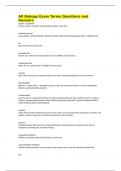
-
AP Biology Exam Terms Questions and Answers
- Exam (elaborations) • 23 pages • 2024
-
- $10.89
- + learn more
AP Biology Exam Terms Questions and Answers organic compounds contain carbon; examples include lipids, proteins, and carbs functional groups amino (NH2), carbonyl (RCOR), carboxyl (COOH), hydroxyl (OH), phosphate (PO4), sulfhydryl (SH) fat glycerol and three fatty acids saturated fats bad for you; animals and some plants have it; solidifies at room temp. unsaturated fats better for you, plants have it; liquifies at room temp. steriods lipids whose structures resem...
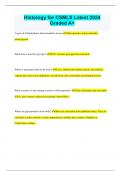
-
Histology for CSMLS Latest 2024 Graded A+
- Exam (elaborations) • 9 pages • 2024
- Available in package deal
-
- $9.99
- + learn more
Histology for CSMLS Latest 2024 Graded A+ 3 types of Carbohydrates demonstrated in tissues Glycoproteins, polysaccharides, proteoglycans What stain is used for glycogen? PAS - because glycogen has vicin diols Where is glycogen found in the body? Liver, skeletel and cardiac muscle, hair follicles, vaginal and ectocervical epithelium, mesothelium cells, neutrophils and megakaryocytes. What accounts for the staining reaction of Glycoproteins? sialic acid goups and vicin diols (PAS...
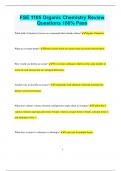
-
FSE 1105 Organic Chemistry Review Questions 100% Pass
- Exam (elaborations) • 16 pages • 2024
-
- $9.99
- + learn more
FSE 1105 Organic Chemistry Review Questions 100% Pass What field of chemistry focuses on compounds that include carbon? Organic Chemistry What are covalent bonds? Bonds created when two atoms share electrons between them. How would you define an isomer? Two or more substances that have the same number of atoms of each element but are arranged differently. Another way to describe an isomer? Compounds with identical molecular formulas but distinct structural formulas. What does...
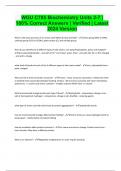
-
WGU C785 Biochemistry Units 2-7 | 100% Correct Answers | Verified | Latest 2024 Version
- Exam (elaborations) • 23 pages • 2024
- Available in package deal
-
- $13.49
- + learn more
What is the basic structure of an amino acid? What do they look like? - amino group (NH2 or NH3), carboxyl group (COO or COOH), alpha carbon (C), and variable group How do you identify the 3 different types of side chains: non-polar/hydrophobic, polar, and charged? - Non-polar/hydrophobic - end with CH or "can't have" water. Polar - end with OH, SH, or NH. Charged - end with a charge what kinds of bonds do each of the 3 different types of side chains make? - ionic, hydrophobic/nonpolar, ...
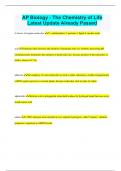
-
AP Biology - The Chemistry of Life Latest Update Already Passed
- Exam (elaborations) • 19 pages • 2024
- Available in package deal
-
- $9.99
- + learn more
AP Biology - The Chemistry of Life Latest Update Already Passed 4 classes of organic molecules 1. carbohydrates 2. proteins 3. lipids 4. nucleic acids acid substance that increases the molarity of hydrogen ions in a solution, decreasing pH (simultaneously diminishes the molarity of hydroxide ions, because product of the molarities of both is always 10^-14) adhesion the tendency of water molecules to stick to other substances; enables transportation of H2O against gravity in vascular...
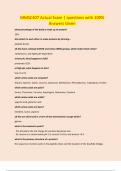
-
MMSC407 Actual Exam | questions with 100% Answers Given
- Exam (elaborations) • 17 pages • 2024
- Available in package deal
-
- $12.99
- + learn more
what percentage of the body is made up of protein? 20% AAs attach to each other to make proteins by forming... peptide bonds all AAs have carboxyl (COOH) and amino (NH2) groups, which makes them what? zwitterionic, and highly pH dependent at low pH, what happens to AAs? protonate COO-
![Exam (elaborations) WGU C785 EXAM [QUESTIONS AND ANSWERS GRADED A] [LATEST VERSION 2023/2024] What is the basic structure of an amino acid? What do they look like? - CORRECT ANSWER amino group (NH2 or NH3), carboxyl group (COO or COOH), alpha carbon (C),](/docpics/3636910/652e3a22a1b08_3636910_121_171.jpeg)
-
Exam (elaborations) WGU C785 EXAM [QUESTIONS AND ANSWERS GRADED A] [LATEST VERSION 2023/2024] What is the basic structure of an amino acid? What do they look like? - CORRECT ANSWER amino group (NH2 or NH3), carboxyl group (COO or COOH), alpha carbon (C),
- Package deal • 2 items • 2023
-
- $20.49
- + learn more
Exam (elaborations) WGU c785 Final Exam[GRADED A 2023/2024] [QUESTIONS AND ANSWERS] 2 Exam (elaborations) WGU C785 EXAM [QUESTIONS AND ANSWERS GRADED A] [LATEST VERSION 2023/2024] What is the basic structure of an amino acid? What do they look like? - CORRECT ANSWER amino group (NH2 or NH3), carboxyl group (COO or COOH), alpha carbon (C), and vari
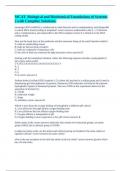
-
MCAT- Biological and Biochemical Foundations of Systems || with Complete Solutions.
- Exam (elaborations) • 262 pages • 2024
-
Available in package deal
-
- $17.99
- + learn more
messenger RNA (mRNA) is synthesized in what direction and is complementary and antiparallel to which DNA strand (coding or template)? correct answers synthesized in the 5'-->3' direction and is complementary and antiparallel to the DNA template strand. It is identical to the DNA coding strand. How are the basal layer of the epidermis and the innermost lining of the small intestine similar? A. both are nondividing tissues B. both are derived from ectoderm C. both are composed of squamo...
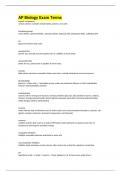
-
AP Biology Exam Terms
- Exam (elaborations) • 23 pages • 2024
- Available in package deal
-
- $10.49
- + learn more
AP Biology Exam Terms organic compounds contain carbon; examples include lipids, proteins, and carbs functional groups amino (NH2), carbonyl (RCOR), carboxyl (COOH), hydroxyl (OH), phosphate (PO4), sulfhydryl (SH) fat glycerol and three fatty acids saturated fats bad for you; animals and some plants have it; solidifies at room temp. unsaturated fats better for you, plants have it; liquifies at room temp. steriods lipids whose structures resemble chicken-wire fence...
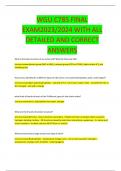
-
WGU C785 FINAL EXAM2023/2024 WITH ALL DETAILED AND CORRECT ANSWERS
- Exam (elaborations) • 27 pages • 2023
-
- $8.99
- + learn more
What is the basic structure of an amino acid? What do they look like? (correct answer)amino group (NH2 or NH3), carboxyl group (COO or COOH), alpha carbon (C), and variable group How do you identify the 3 different types of side chains: non-polar/hydrophobic, polar, and charged? (correct answer)Non-polar/hydrophobic - end with CH or "can't have" water. Polar - end with OH, SH, or NH. Charged - end with a charge what kinds of bonds do each of the 3 different types of side chains ma...

How did he do that? By selling his study resources on Stuvia. Try it yourself! Discover all about earning on Stuvia


